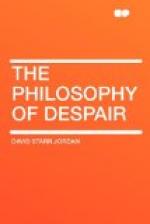One of the few things that we may know in life is this, that it is impossible for man to know anything absolutely. The power of reasoning is a mere “by-product in the process of Evolution.” It is but an instrument to help out the confusion of the senses, and it is conditioned by the accuracy of the sense-perceptions with which it deals. There is no appeal from experience to reason, for reason is powerless to act save on the facts of human experience. Speculative philosophy can teach us nothing. The senses and the reason are intensely practical and all, our faculties are primarily adapted to immediate purposes. Instruments such as these cannot serve to probe the nature of the infinite. But no other instruments lie within reach of man. If we cannot “reach the heart of reality” by reason, what indeed can we reach? What right have we to know or to believe? And if we can know or believe nothing, what should we try to do? And how indeed can we do anything? Every man’s fate is determined by his heredity and his environment. In the Arab proverb he is born with his fate bound to his neck. In the course of life we must do that which has been already cut out for us. Our parts were laid for us long before we appeared to take them. He is indeed a strong man who can vary the cast or give a different cue to those who follow. Nature is no respecter of persons, and to suppose that any man is in any degree “the arbiter of his own destiny” is pure illusion. We are thrust forth into life, against our will. Against our will we are forced to leave it. We find ourselves, as has been said, “on a steep incline, where we can veer but little to the left or right”; whichever way we move we fall finally to the very bottom. The fires we kindle die away in coals; castles we build vanish before our eyes. The river sinks in the sands of the desert. The character we form by our efforts disintegrates in spite of our effort. If life be spared we find ourselves once again helpless children. Whichever way we turn we may describe the course of life in metaphors of discouragement.
To the pessimistic philosopher the progress of the race is also mere illusion. There is no progress, only adaptation. Every creature must fit itself to its environment or pass away. The beast fits the forest for the same reason that the river fits its bed. Life is only possible under the rare conditions in which life is not destroyed.
In such fashion we may ring the changes of the despair of philosophy. If we are to take up the threads of life by the farther end only, we shall never begin to live, for only those which lie next us can ever be in our hand. To grasp at ultimate truth is to be forever empty-handed. To reach for the ultimate end of action is never to begin to act.
Deeper and more worthy of respect is the sadness of science. The effort “to see things as they really are,” to get out of all make-believe and to secure that “absolute veracity of thought” without which sound action is impossible does not always lead to hopefulness.




